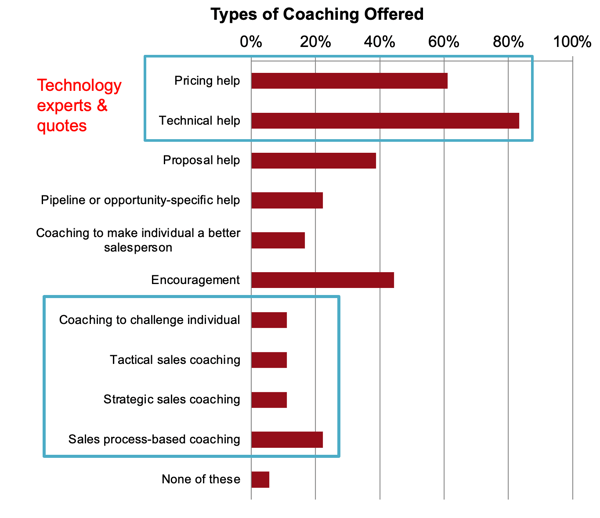We Often Focus on Our Product Rather Than the Buyer's Business Outcome
Industrial manufacturers love to talk about the stuff they make.
It makes sense. There's a lot of personal emotional investment in the myriad of technical details that they've lovingly engineered into their product through countless iterations.
So that's what they talk about. Features, specs, technical considerations, application intricacies.
And that feels natural and appropriate because they're often responding to "project" discussions with engineers who have a list of certain information to collect and production requirements to fulfill.
Not only is this the topic of most "sales call" discussions, but it's the focus of most manufacturing marketing.
And it generally fails.
Sure, you get some orders. Orders that you probably would have gotten anyway as the buyer has independently connected the dots between investment in your machinery and their business results.
Real sales (particularly in challenging market environments) happen when your team is able to help the buyer see, and then connect those dots; to understand why they need to change and the cost/risk implications of (not) changing.
But that's a really difficult skill to develop. Therefore it takes coaching.
"No problem," you say. "We do coach our sales team."
You're Skipping the Important Sales Coaching....Because it's Harder
Below you'll see actual data from a recent sales force evaluation.

This is typical.
And it shows that most sales coaching is misplaced. It focuses on what's easy, convenient, and comfortable.
Pricing...is it any wonder that discounting is a leading frustration of CEOs?
And technical aspects. If you believe that's why people buy your machinery, then it makes sense that that's what you'd focus coaching on. Is it any wonder, therefore, that mediocre sales people are often tolerated because their years of accumulated technical experience would be impossible to replace?
Throw in a bit of cheerleading and the coaching box is checked.
Except it's not.
Look at what's neglected! Coaching to:
- develop the individual sales person
- improve tactics
- improve strategy
- challenge sales people
- develop process adherence and proficiency
In other words, THE SALES STUFF!!
Capital Equipment Sales Don't Just Happen
Great industrial sales success has always required extraordinary discipline, grit, determination, and commitment.
There's rejection to overcome. There are activity levels that drive results. There are competitors constantly seeking to flank you. Buyers are becoming savvier and more jaded. And markets change.
Great sales people have always worked diligently to hone their sales skills and market understanding.
Some organizations created a culture of discipline, improvement, learning, and success. Others have lagged.
But generally, companies knew they had to work at it. They believed that sales people had to improve.
Something changed, though, as it became clear that buyers could use the internet to take more control of their own research and decisions.
That's led to a broad malaise - a trend of sales people, sales managers and leaders, and execs who now accept that sales is a passive activity that can't be materially improved. After all, they reassure themselves, the buyers are in charge and acquiesce because we now know that sales best practice is to help buyers buy! (Of course that means helping them reach the right outcome, not enabling their mistakes.)
The necessary roadmap for proactive sales improvement has been abandoned just as the contemporary sales landscape demands increased rigor, skill, continuous improvement and careful management.
In other words, just as market conditions require even more from sales management and people, sadly many leaders have retreated from the task.
The Best Performers Have the Best Coaches
Top performers have coaches.
They work together relentlessly to diagnose and improve progressively smaller granular performance elements. That could mean gradually moving from blocking time for cold calls, through a number of intermediate steps, to debriefing from recordings of seven or eight discrete aspects of a cold call. Rehearsing until they are right, and measuring and revisiting to track success.
Strong performers welcome that.
Weak performers resent it - you've probably heard the "I've forgotten more about sales than (s)he'll ever know!" line. Or it's companion "I'm not filling in their CRM just so they can track me. I'm an adult professional."
So if your sales team doesn't clamor for coaching (and even invest in it on their own) much less resists it, that's an important warning sign.
And if your sales managers focus on technical differentiation and pricing, they're not positioned to elevate your team's performance to the level required by markets today.
In fact, they're abdicating their responsibility to help their team grow and improve, and they're costing your company money by engaging in price discussions to close deals rather than rewinding the sales process to figure out where your sales people lose sight of value, and fall into the pricing rabbit hole.
Great Sales People Demand Vigorous Sales Coaching
If your team isn't demanding more, you might have superstars.....or you might not.
Wondering how you can know either way?

